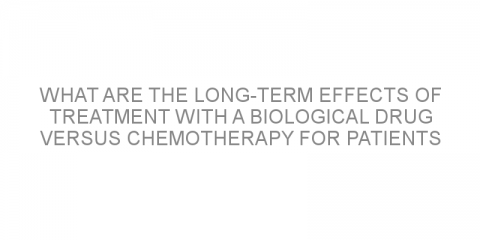In a nutshell This study looked at the outcomes of durvalumab (Imfinzi) in patients with unresectable (cannot be surgically removed) stage 3 non-small cell lung cancer (NSCLC) who received different combinations of chemoradiotherapy (CRT) previously. The authors found that the use of durvalumab improved survival in all patients previously treated...
Read MoreType(s) of biological therapy-Other Posts on Medivizor
Does continuous nivolumab improve outcomes in advanced non-small cell lung cancer?
In a nutshell This study compared 1-year fixed-duration versus continuous nivolumab (Opdivo) for the treatment of previously treated advanced non-small-cell lung cancer (NSCLC). The authors found that continuing nivolumab beyond a fixed duration of 1-year may improve patient outcomes. Some background NSCLC is the most common form of lung cancer....
Read MoreSafety and patient-reported outcomes of atezolizumab with or without bevacizumab plus chemotherapy vs bevacizumab plus chemotherapy in non-small-cell lung cancer
In a nutshell This study was conducted to assess the safety and patient reported outcomes (PRO) of the addition of atezolizumab (Tecentriq) to chemotherapy with and without bevacizumab (Avastin) vs bevacizumab plus chemotherapy in the treatment of nonsquamous non-small cell lung cancer (NSCLC). The addition...
Read MoreWhat side effects of the skin can biological therapy cause?
In a nutshell This article reviewed the skin side effects caused by anti-PD-1 biological therapy. Some background Anti-PD-1 is a type of biological therapy that has significantly improved treatment results for patients with certain types of cancer. It works by blocking PD-1, a molecule that cancer cells use to switch off the immune system. When the...
Read MoreWhat are the long-term effects of treatment with a biological drug versus chemotherapy for patients with advanced non-small cell lung carcinoma?
In a nutshell This study compared the long-term effects of biological drug pembrolizumab (Keytruda) with chemotherapy drug docetaxel (Taxotere) in patients with advanced non-small cell lung carcinoma (NSCLC). The study found that pembrolizumab increased survival and had fewer side effects than docetaxel. Some background Patients with advanced...
Read MoreRegorafenib side effects: how can we prevent them?
In a nutshell This article reviewed the most common side effects of regorafenib (Stivarga) treatment for patients with metastatic (spread) colorectal cancer (mCRC). The author suggested methods to prevent these side effects to increase treatment adherence. Some background The standard treatment for mCRC is chemotherapy combined with...
Read MoreLooking for patients with non-small cell lung cancer to test a new immunotherapy combination
In a nutshell This phase 2 trial will investigate the safety and effectiveness of different treatment combinations containing durvalumab (Imfinzi) in non-small cell lung cancer (NSCLC). The main outcome will be the objective response rate (ORR). The details Non-small cell lung cancer (NSCLC) is a common form of lung cancer. It is often diagnosed at...
Read MoreDoes radiotherapy improve outcomes for patients with primary breast diffuse large B-cell lymphoma?
In a nutshell This study evaluated the impact of radiotherapy on the outcomes of rituximab (Rituxan)-treated patients with primary breast diffuse large B-cell lymphoma. This study concluded that radiotherapy has significant therapeutic benefits for these patients. Some background Primary breast diffuse large B-cell lymphoma (DLBCL) is a rare type of...
Read MoreASCO 2017: Breast Cancer Research News
Video information: Breast cancer experts gathered at the 2017 American Society of Clinical Oncology meeting to discuss developments in research and treatment. Patient Power founder, Andrew Schorr, was on-site in Chicago and interviewed Dr. Julie Gralow, Director of Breast Medical Oncology at the Seattle Cancer Care Alliance. Dr. Gralow shares...
Read MoreCan a trastuzumab-combination chemotherapy treatment cause skin and nail infections?
In a nutshell The authors aimed to determine whether severe skin and nail infections observed in patients with breast cancer were due to a combination-chemotherapy treatment. Some background Trastuzumab (Herceptin) is a common drug used to treat patients with human epidermal growth factor 2 positive (HER2+) breast cancer. The HER2 protein can...
Read MoreBosutinib: a new drug that increases progression free survival in patients with locally advanced or metastatic breast cancer
In a nutshell This paper presents the results of a clinical study which looked at the use of a new drug called Bosutinib (Bosulif) for the treatment of breast cancers diagnosed as being stage III or IV. In patients previously treated with chemotherapy, Bosutinib showed promising efficacy in delaying cancer progression. Some background Locally...
Read MorePhase I trial to determine the safety of a new anti-cancer drug: PD 0332991
In a nutshell This article presents the results from the first human trial of PD 0332991, a new anti-cancer drug. The main objective of the study was to determine the safety and recommended dose for further testing. Results warrant further studies and revealed that neutropenia (low white cell count) was the main side effect. Some background Cells...
Read More












